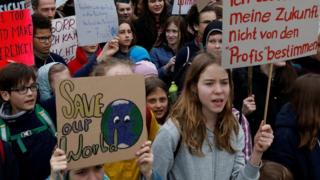Plan for 25% of EU budget to fight climate change
Eight European countries have called for an ambitious strategy to tackle climate change – and to spend a quarter of the entire EU budget on fighting it.
The joint statement says the EU should have net-zero greenhouse gas emissions by 2050 “at the latest”.
It was signed by France, Belgium, Denmark, Luxemburg, Netherlands, Portugal, Spain, and Sweden.
The group says their plan can “go hand in hand with prosperity” and “set an example for other countries to follow.”
The position paper comes ahead of a major summit of European leaders in Romania, beginning on Thursday, which will discuss the future of Europe and the EU’s strategy for the next five years.
But not everyone is on board – there are 28 countries in the EU, and several of those absent from the joint position statement are significant players – including Germany.
What does the paper say?
The position of the eight countries is that climate change has “profound implications for the future of humanity” and that its impacts are already apparent – citing “the heat waves and scorching fires of last summer”.
The group also say that their citizens are clearly concerned “as shown by the recent mobilisation of young people” – in an apparent reference to the wave of walk-outs and marches by schoolchildren across the continent.
The Extinction Rebellion protests in London in April also gained widespread attention and have spread to other countries.
“The EU budget currently under negotiation will be an important tool in this respect: at least 25% of the spending should go to projects aimed at fighting against climate change,” the paper said.
It also added that “as a general principle” the EU budget should not fund anything which would add to climate emissions.
The eight want the EU to announce a policy of zero emissions by 2050 at the United Nations climate summit in September, and strengthen its existing targets at the same time.
At the moment, EU countries are required to cut greenhouse gas emissions by 20% from their 1990 levels by 2020, with the aim of raising that to a 40% reduction by 2030. But many are set to miss these targets – some by a wide margin.
Some of the eight countries behind the proposal have already made stronger commitments. French President Emmanuel Macron has made climate change a key issue for campaign speeches, while Sweden has already announced plans to become carbon neutral by 2045.
What about the other 20 countries?
Speaking at a press conference with Dutch Prime Minister Mark Rutte on Monday, Mr Macron said the joint document was “ambitious” and that “we are in the middle of building a coalition on this”.
The goal of a carbon-neutral Europe by 2050 is not new – it was proposed by the European Commission, which is the starting point for European Union legislation, in November 2018.
The Commission’s plan was based around the Paris agreement targets of keeping global warming to “well below” a 2C increase, and “pursue efforts” to reach 1.5 degrees as a limit.
But such proposals need the support of the European Parliament – and ultimately the approval of the European Council, made up of the leaders of each member state.
Those leaders will be meeting informally at the summit in Sibiu, Romania. The position paper by eight of them is likely to be used as a launching point to bring others on board.
But several countries oppose strengthening current commitments, which have proven difficult to stick to just two years after the Paris climate agreement was signed.
Political and economic giant Germany is among them, fearing that further action could damage its industry. Poland, which still relies on coal for power, is among the central European nations opposed to such plans.
The UK, meanwhile, will be represented at the summit – by the Brexit Secretary, Stephen Barclay. Prime Minister Theresa May is not expected to attend.
Source: Read Full Article



